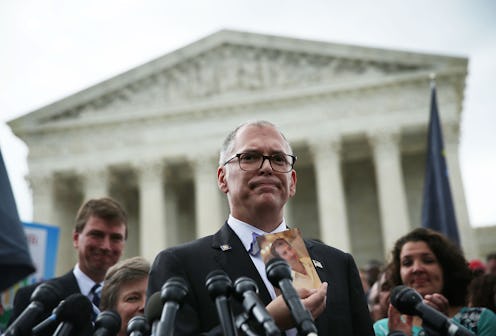News
Jim Obergefell Doesn't Buy Trump's LGBT Efforts
In one of the more curious moves for even this election, Donald Trump has reached out to the LGBTQ community (sort of). As far as his Republican presidential rivals went, he was positively progressive in his stance towards the North Carolina bathroom bill, though that isn't saying much. Then, after the devastating attack on an Orlando gay nightclub, Pulse, which is considered the worst mass shooting in U.S. history, Trump tweeted "Thank you to the LGBT community! I will fight for you while Hillary brings in more people that will threaten your freedoms and beliefs." But many LGBT activists aren't buying Trump's overtures — including Jim Obergefell, the lead plaintiff in the landmark Supreme Court case for marriage equality, Obergefell v. Hodge.
"I don't think it’s genuine at all," Obergefell tells me of Trump's recent efforts to win over LGBTQ voters. "I think this [his Orlando response] is just another example of Donald Trump saying what he thinks people want to hear, without realizing what he’s said before, and understanding that he contradicts himself. And we remember those things."
Obergefell says he came out in support of Hillary Clinton last fall, and he quickly rattles off why he isn't convinced by Trump's ostensible outreach to switch his vote. "If he [Trump] were truly a friend of the LGBTQ community, he would have never said that he would appoint justices to the Supreme Court who would be against marriage equality and who would be open to overturning it," he says, a point that has also been highlighted by other LGBTQ activist groups, including Human Rights Campaign.
Obergefell does say that Trump was not as aggressively anti-LGBTQ as some of his fellow Republican candidates this election. In fact, he believes that Trump hasn't been as bad in his language towards the LGBTQ community as he has been to other minority groups. "Compared to a lot of other candidates, he [Trump] was one who really did not go after us and target us and say incredibly hateful and inappropriate things, like he did with so many other communities," Obergefell points out. Still, he insists that any candidate opposed to marriage equality is "not a friend" of the LGBTQ community.
In general, though, Obergefell says he was taken aback watching the Republican primary and hearing the rhetoric towards the LGBTQ community. "I still find it so disappointing and disheartening that in 2016, we have candidates who are still more than willing to say we don’t deserve equal rights, we don’t deserve the same rights, protections, benefits as other Americans."
Because marriage equality is so important to Obergefell, I ask him if he was ever swayed to back Bernie Sanders over Clinton, since the Vermont senator supported same-sex marriage before she did (he in 2009; she in 2013). "No, absolutely not," he says. "That's not a driving factor in any decision I make." While he describes Sanders as "definitely a friend of the LGBTQ community," the fact that Sanders championed some LGBTQ rights and protections — such as voting against the Defense o fMarriage Act in 1996 when Clinton supported it — sooner than his Democratic rival did not change Obergefell's mind about backing the former Secretary of State.
"For me, the most important thing is when someone realizes that maybe a position or an opinion they held wasn’t the right thing, they change that," Obergefell tells me. "We want people to get there. And when they get there, we should welcome them with open arms and say, 'Thank you. We’re glad to have you.' Not reject them because it took a week, a month, a year, five years longer."
However, until Obergefell believes Trump's claims to protect the LGBTQ community are genuine and sees evidence that the presumptive GOP nominee has actually changed his views on key issues, he's certainly not ready to embrace him.
